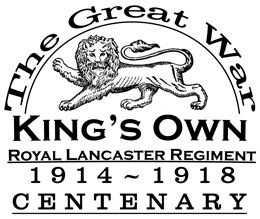 |
King's Own Royal Regiment Museum Lancaster |
|
|
HOME Museum & Collections Sales Donations Events Contact Us  REGIMENTAL HISTORY 17th Century 18th Century 19th Century 20th Century First World War Second World War Actions & Movements Battle Honours FAMILY HISTORY Resources Further Reading PHOTO GALLERY ENQUIRIES FURTHER READING LINKS
© Images are copyright, Trustees of the King's Own Royal Regiment Museum. |
 The Great War News from Lancaster in 1914 22nd August 1914 War News Amateur Sentry At the Judges’ Lodgings on Wednesday James William Thompson was charged with being drunk the previous day in Chipping Road, Ellel. PC Barrett said he was drunk and calling on people to halt, while he told cyclists to put their lights out. – A fine of 10 s. or 14 days was imposed by Mr Garnett. Lancaster a Prison Centre The Lancaster Wagon Works have been prepared this week by a Nottingham Contractor for the reception of German prisoners – those who have been detained by the authorities and not allowed to return to Germany. A company of the 3rd Battalion Royal Welsh Fusiliers (Special Reserves) arrived on Thursday to take charge of the prisoners. Barbed wire has been freely used around the walls of the building, and the railway enables trains to go straight to the works. Recruiting Brisk The announcement that General Sir Archibald Hunter KCB, Lancaster’s honorary freeman, will command the division of “Kitchener’s Army” at Salisbury Plain will be gratifying to recruits. Up to Thursday about 550 had enrolled in the new battalion of the King’s Own at Lancaster. The old Town Hall is utilised as a recruiting station and presents a busy appearance. A motor-car is used for country recruiting. Squads of the new recruits daily receive instructions from NCOs in the barrack fields. On Wednesday night a batch of 170 men left for Salisbury Plain, singing on their way to the Castle Station. They will receive six months training. Territorials for Active Service Lord R Cavendish’s Message to Lancaster Amid the sweltering heat of the mid-day sun, there were stirring
scenes in Lancaster on Friday, when the 5th King’s Own Royal Lancaster
Regiment were under orders to leave for the South of England. They had
unanimously decided to volunteer for active service while mobilised for
home defence, and were brought home for medical examination on
Wednesday, proceeding to the old Wagon Works to “await orders”. They had
not long to wait, as telegraphic orders were received during Thursday
night for the men to proceed to the South for a convenient centre for
further instructions. Leaving the Wagon Works shortly after noon on
Friday, they marched through the town to the Castle Station. A
tremendous crowd awaited them on Green Ayre and in Parliament Street,
and the streets were lined right up to the station gates. The men were
in most cheerful spirits, and repeatedly burst into song. One or two
were overcome by the heat, but their “comrades in arms” helped them
forward. German Sailors become Prisoners of War At Lancaster Castle on Saturday, Wilhelm Mattensen, and Hermin Schletur, two well built German sailors of the SS Chloris (Glasgow) which put into Glasson on the 7th August were charged with failing to register under the Aliens Act. They said they did not know a state of war existed. Superintendent Scott said the man had no vouchers and had no residence in England. He asked that they be handed over to the police escort to be sent to a Military prison. The Chairman (Mr Garnett) said they would be discharged and the police would be asked to take them to a military prison as soon as possible. They were removed to Queensferry later in the day. Royal Lancaster Infirmary’s Offer to the Government. A special meeting of the General Committee of the Royal Lancaster Infirmary was held on Saturday to consider what number of beds could be placed at the disposal of the Government. After much considerations of the problem, it was decided to offer 30 beds to the Government. This was possible by turning the day rooms into hospital wards, and temporarily utilising other rooms. An offer by the Friends’ Hall Committee, to allow the Friends’ Hall on Fenton Street to be fitted up as a hospital was gratefully accepted. By transferring inmates of the women’s ward from the Infirmary to the Friend’s Hall, it will be possible to make a complete hospital there, for there are rooms which can be utilised for nurses, and there are facilities for cooking, etc. The Committee at once, after accepting the offer of the Friends’ Hall, decided to intimate to the Government that the offer of 30 beds might by increased if necessary by 12 or 16 more. Scholars to Help with Harvest Mr W Garnett, (chairman of the South Lonsdale Education Committee),
announced at Lancaster Castle on Saturday, that during the crisis like
the present when the harvest was ready to be cut and gathered as quickly
as possible, it was absolutely necessary to free as much labour as
possible in the district, in which the committee administered the
elementary schools. No. 2 area of the County, comprising 37 schools, The
Committee therefore wished it to be known that all the farmers who have
harvesting to do could employ children on their farms, and parents would
not be prosecuted for absence from school during such items as the
children were bona fide employed in harvesting. He hoped that the fine
weather would continue and that farmers would take advantage of it to
the full extent. A farmer could he was reminded by Mr Smith, also employ
children of neighbours.
Only a proportion of our collections are on display at anyone time. Certain items are on loan for display in other institutions. An appointment is required to consult any of our collections which are held in store. |
